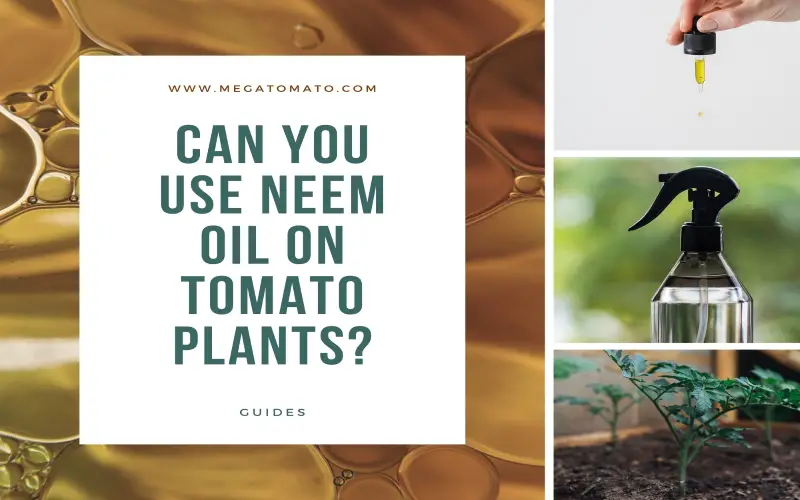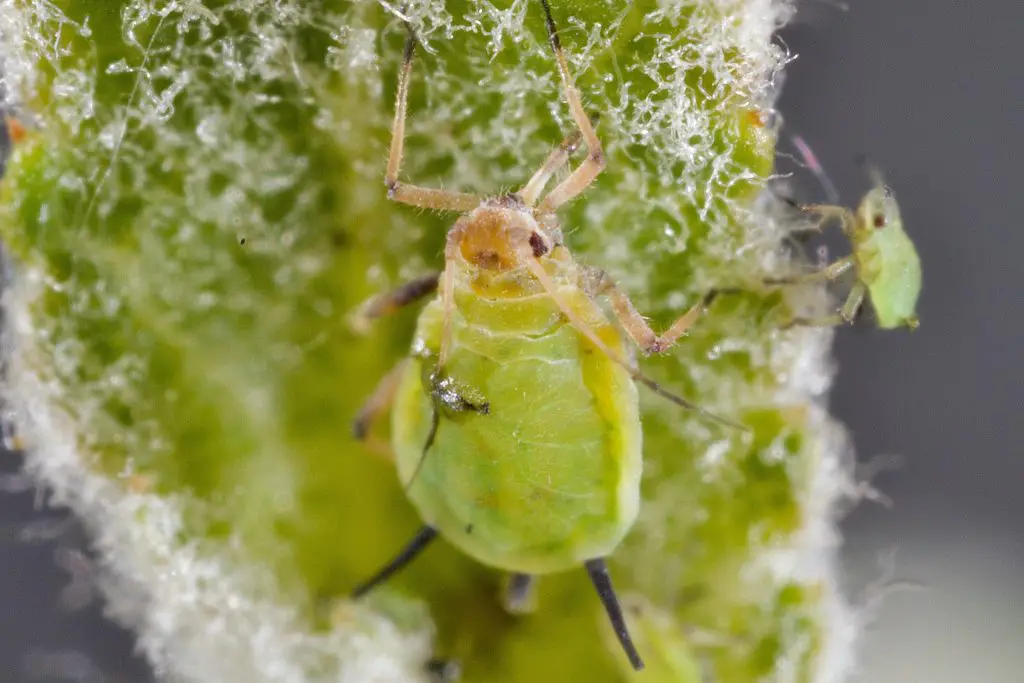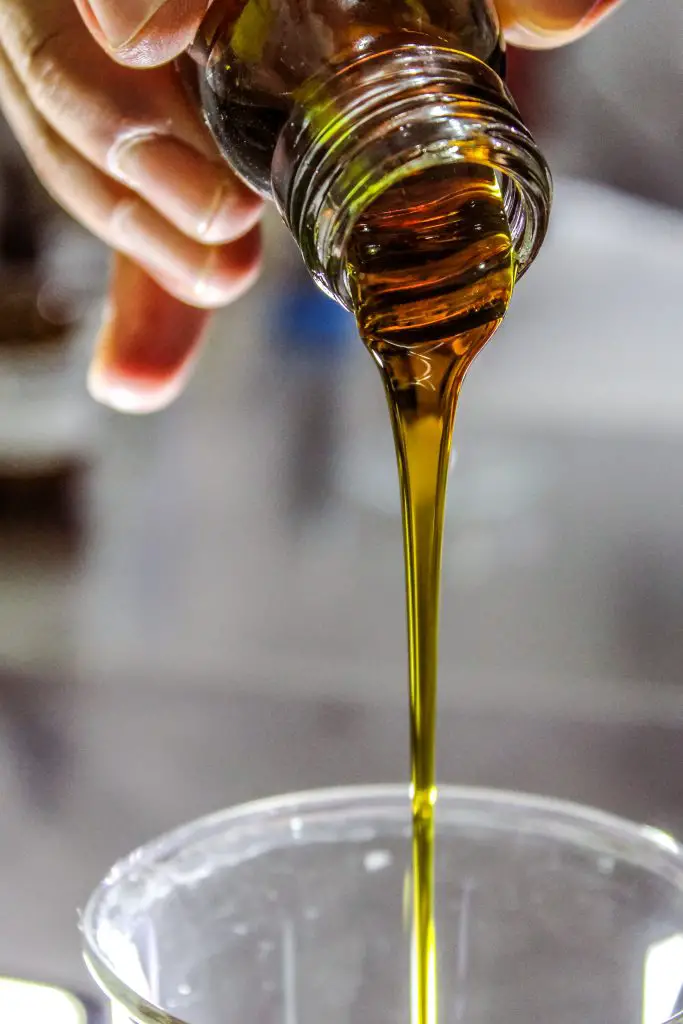You may or may not, have heard that neem oil is a good natural way of repelling insects in the garden. But can neem oil be used on tomato plants as well?

Neem oil is safe to be used for tomato plants and all your other vegetables. Neem oil is safe to be used for indoor tomatoes and is safe to be used around pets as well.
But before running out to the garden and starting to spray the tomato plants with neem oil, let’s learn more about it.
In this article, you can read about what neem oil is exactly. You will get to know its benefits and how to use it.
What is Neem Oil?
Neem oil is extracted from the Azadirachta Indica tree (Neem Tree). To obtain the neem oil can be used any part of this tree, such as the seeds or bark.

Azadirachta Indica originated in India and Southern Asia. However, nowadays can be easily grown in any backyard.
The seeds and the bark of the Azadirachta Indica tree have been used for a long time in Southern Asia for detoxifying the blood and for immune and respiratory system support.
The seeds, by containing a high concentration of Azadirachtin, are the perfect natural insecticides.
While the extract from the bark and the other parts of the tree was used for manufacturing different cosmetics, soaps and toothpaste as well.
Can You Use Neem Oil on Tomato Plants?
Neem oil is often used as a natural pesticide and it is safe to be used on tomato plants as well.
However, neem oil has many other benefits as well. Let’s see what are these:
Benefits of Neem Oil
Effective Insecticide – Neem oil, once sprayed on the tomato plants, is absorbed by the plant and it is transferred to the pest while these suck and chew the plant.

It may take 3 days to see the results, but it will kill the pests in any stage of growth. Neem oil can be used to kill mites, mealybugs, leafhoppers, aphids, caterpillars, thrills and even whiteflies.
Effective Fungicide and Bactericide – Neem oil can also stop the spread of fungi and different bacteria that can cause diseases.
This oil is effective in eliminating Blackspot, Leaf spot, Root rot, Powdery mildew, Rust, Tip Blight, Anthracnose and Fire Blight.
Safe to Be Used Indoors – As I mentioned above, neem oil is safe to be used on tomato plants that are grown in a greenhouse or your home. This will kill aphids, whiteflies or other insects that may attack your indoor tomato plant.
Neem Cakes as Fertilizer – Neem Kernels (cakes) are a great way of fertilizing your tomato plants.
It releases the nutrients slowly; however, it doesn’t contain any harmful metals that most chemical fertilizers do.
Neem Oil Effective Against Nematodes – Nematodes will feed on the roots of the tomato until they kill the plant. Getting rid of nematodes can be quite challenging since the pesticides will not kill them after they get into the roots.
Therefore, neem oil is the best way of killing nematodes as this oil contains notriterpenoids and isoprenoids, which are natural nematicides.
How to Use Neem Oil?
Nem oil is very easy to be used on your tomato plants. It can be used in two ways:
- As foliar neem oil spray
- Neem oil soak
- Neem cake as fertilizer
Foliar Neem Oil Spay
For the foliar neem oil spray, you will need:
- Neem oil
- Water
- Spray bottle
- Organic soap
- Gloves
How to apply:
- Depending on the manufacturers’ ratio (make sure you check the label every time), use 2 to 4 tablespoons of Neem oil for one gallon of water.
- You can also add some organic soap to the mixture. But make sure you don’t use too much soap, as this can burn the tomato plants’ leaves. To ensure the mixture is not too strong, spray one of the bottom leaves as a test. If that gets yellow until the next day, that means the mixture is too strong. So, you should reduce the amount of soap you are using.
- After the right mixture is made, pour it into a spray bottle.
- Spray the mixture on the tomato plant making sure you cover all the leaves, stems, fruits and flowers. Don’t forget the underside of the leaves as there can hide many pests.
- While spraying, shake the bottle from time to time to ensure a balanced mixture at all times.
- Apply the mixture every 7 to 14 days.
- The mixture should be used within 8 hours and the leftover should be disposed of.
- To prevent any irritation, you can use gloves. The neem oil mixture doesn’t have any toxic fumes, but if you find the smell unpleasant and too strong, you can also use a face cover to protect yourself.
Neem Oil Soak
Neem oil soak seems the most effective way of using neem oil. The only drawback is that the effect will be shown later than the effect of the spray.
What you need:
- 100% cold-pressed raw neem oil
- Emulsified Water

How to apply:
- Add one tablespoon of 100% cold-pressed raw neem oil to a quart of emulsified water.
- Pour 2-3 cups of this mixture to the base of every tomato plant. This will soak into the soil and will be absorbed by the plants’ roots.
- The process can be repeated every two weeks.
- The neem oil enters into the whole plant and targets the pests that are puncturing the plant and sucking out the juices.
The effect of soaking will remain for 22 days. The oil mimics the insects’ natural hormones that will stop them from eating and spreading by causing infertility in adult insects.
Neem Cake
The neem cake is the solid leftover from the oil’s extraction process.
Following the instruction from the package, crumble the neem cakes on the soil of the tomatoes and leave them to do the job.
Neem cakes are a great way of fertilizing plants, as it contains a rating of 4-1-2 NPK micronutrients.
Neem cakes are also good to fight against nematodes, grubs and other root infections.
When to Use Neem Oil?
If you need a quick effect of the neem oil and prefer to use the spraying mixture, make sure you spray it on the plant early in the morning or late in the evening. This way you prevent hurting other beneficial insects such as ladybugs or butterflies.
Also, avoid spraying your tomato plants when it is too hot or too cold.
Avoid spraying too much mixture, especially on the new plants that are small and fragile. Neem oil in excess can burn your plants.
To try out the mixture, you can first test it on a small portion of the plant.
Neem oil can be used even in the harvesting season, but before eating the ripened tomato, make sure you wash the fruits with plenty of water.
Wrap Up
Neem oil is one of the best natural pesticides that are safe to be used even on indoor plants.
However, it can be toxic to people if consumed directly. So, before eating that juicy and tasty tomato fruit, make sure you wash it well with plenty of water.
Remember, neem oil can be used in many ways, but before use, read the labels to avoid errors.
